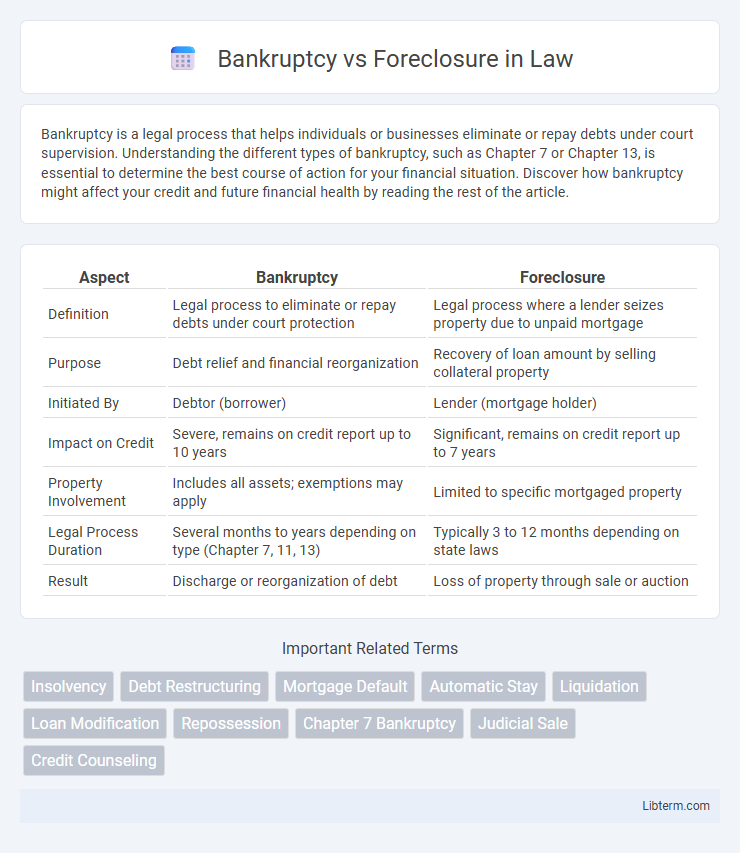Bankruptcy is a legal process that helps individuals or businesses eliminate or repay debts under court supervision. Understanding the different types of bankruptcy, such as Chapter 7 or Chapter 13, is essential to determine the best course of action for your financial situation. Discover how bankruptcy might affect your credit and future financial health by reading the rest of the article.
Table of Comparison
| Aspect | Bankruptcy | Foreclosure |
|---|---|---|
| Definition | Legal process to eliminate or repay debts under court protection | Legal process where a lender seizes property due to unpaid mortgage |
| Purpose | Debt relief and financial reorganization | Recovery of loan amount by selling collateral property |
| Initiated By | Debtor (borrower) | Lender (mortgage holder) |
| Impact on Credit | Severe, remains on credit report up to 10 years | Significant, remains on credit report up to 7 years |
| Property Involvement | Includes all assets; exemptions may apply | Limited to specific mortgaged property |
| Legal Process Duration | Several months to years depending on type (Chapter 7, 11, 13) | Typically 3 to 12 months depending on state laws |
| Result | Discharge or reorganization of debt | Loss of property through sale or auction |
Understanding Bankruptcy and Foreclosure
Bankruptcy provides a legal process that helps individuals or businesses eliminate or repay debts under court protection, potentially stopping foreclosure temporarily or permanently depending on the case type. Foreclosure specifically refers to the lender's legal right to seize and sell a property after the borrower defaults on mortgage payments, directly leading to property loss. Understanding the distinct functions of bankruptcy and foreclosure is essential for navigating debt relief options and protecting assets during financial distress.
Key Differences Between Bankruptcy and Foreclosure
Bankruptcy is a legal process that helps individuals or businesses eliminate or repay debts under court supervision, while foreclosure is a specific legal action taken by lenders to repossess property due to mortgage default. Bankruptcy can halt foreclosure temporarily through an automatic stay, providing debt relief options such as Chapter 7 liquidation or Chapter 13 repayment plans. Foreclosure solely addresses the loss of real estate collateral, whereas bankruptcy impacts overall financial obligations and can protect multiple assets beyond just the home.
Types of Bankruptcy: Chapter 7 vs Chapter 13
Chapter 7 bankruptcy involves liquidation of assets to discharge most unsecured debts, providing a quicker resolution for individuals with limited income and few assets. Chapter 13 bankruptcy allows debtors to reorganize and repay debts over three to five years, enabling homeowners to avoid foreclosure and keep their property while catching up on missed mortgage payments. Choosing between Chapter 7 and Chapter 13 depends on income level, asset retention goals, and the desire to halt foreclosure proceedings.
The Foreclosure Process Explained
The foreclosure process begins when a borrower defaults on mortgage payments, prompting the lender to issue a notice of default and initiate legal action to reclaim the property. This process involves several stages, including pre-foreclosure, public auction, and eventual transfer of ownership to the lender or a new buyer. Homeowners facing foreclosure may consider filing for bankruptcy, which can temporarily halt the foreclosure process through an automatic stay, giving them time to restructure debts or negotiate with lenders.
Financial Consequences of Bankruptcy
Bankruptcy can provide debt relief by discharging many unsecured debts, but it significantly impacts credit scores, often dropping them by 100 to 200 points and remaining on credit reports for up to 10 years. Foreclosure specifically affects mortgage debt and results in property loss, severely damaging credit scores by 85 to 160 points for 7 years. While bankruptcy may stop foreclosure proceedings temporarily through an automatic stay, the long-term financial consequences include difficulty obtaining new credit, higher interest rates, and potential loss of assets depending on the chapter filed.
Financial Impact of Foreclosure
Foreclosure drastically reduces credit scores, often by 85 to 160 points, severely limiting access to new loans and increasing borrowing costs for years. The financial repercussions include losing home equity and facing potential deficiency judgments that require paying the remaining mortgage balance after the sale. This process can take months, during which additional fees and interest accumulate, intensifying the overall financial burden.
Legal Protections and Rights
Bankruptcy provides legal protections that can delay or stop foreclosure proceedings, allowing individuals to restructure debts or eliminate certain liabilities under Chapter 7 or Chapter 13 filings. Foreclosure, however, is a legal process initiated by lenders to recover loan balances by selling the secured property, with fewer protections once the foreclosure process begins. Understanding the interplay between bankruptcy automatic stay provisions and foreclosure timelines is crucial for preserving homeowner rights and avoiding loss of property.
How Bankruptcy Affects Homeownership
Bankruptcy can temporarily halt foreclosure proceedings through an automatic stay, giving homeowners time to reorganize their finances or negotiate with lenders. Chapter 13 bankruptcy allows borrowers to catch up on missed mortgage payments over three to five years, which may help retain homeownership. However, Chapter 7 bankruptcy can lead to liquidation of assets, and if mortgage arrears are not resolved, foreclosure may eventually proceed.
Preventing Foreclosure Through Bankruptcy
Filing for bankruptcy can temporarily halt foreclosure proceedings by invoking the automatic stay, which stops creditors from seizing the property. Chapter 13 bankruptcy allows homeowners to restructure their debts and create a repayment plan to catch up on missed mortgage payments over three to five years. This legal tool provides a chance to prevent foreclosure and retain homeownership while addressing financial distress.
Choosing the Right Option: Bankruptcy or Foreclosure
Choosing between bankruptcy and foreclosure depends on your financial situation and long-term goals. Bankruptcy can provide immediate relief by stopping foreclosure and restructuring debt, preserving your assets and credit more effectively. Foreclosure results in the loss of property and significantly damages credit, making bankruptcy a strategic option for those needing debt protection and a fresh financial start.
Bankruptcy Infographic

 libterm.com
libterm.com